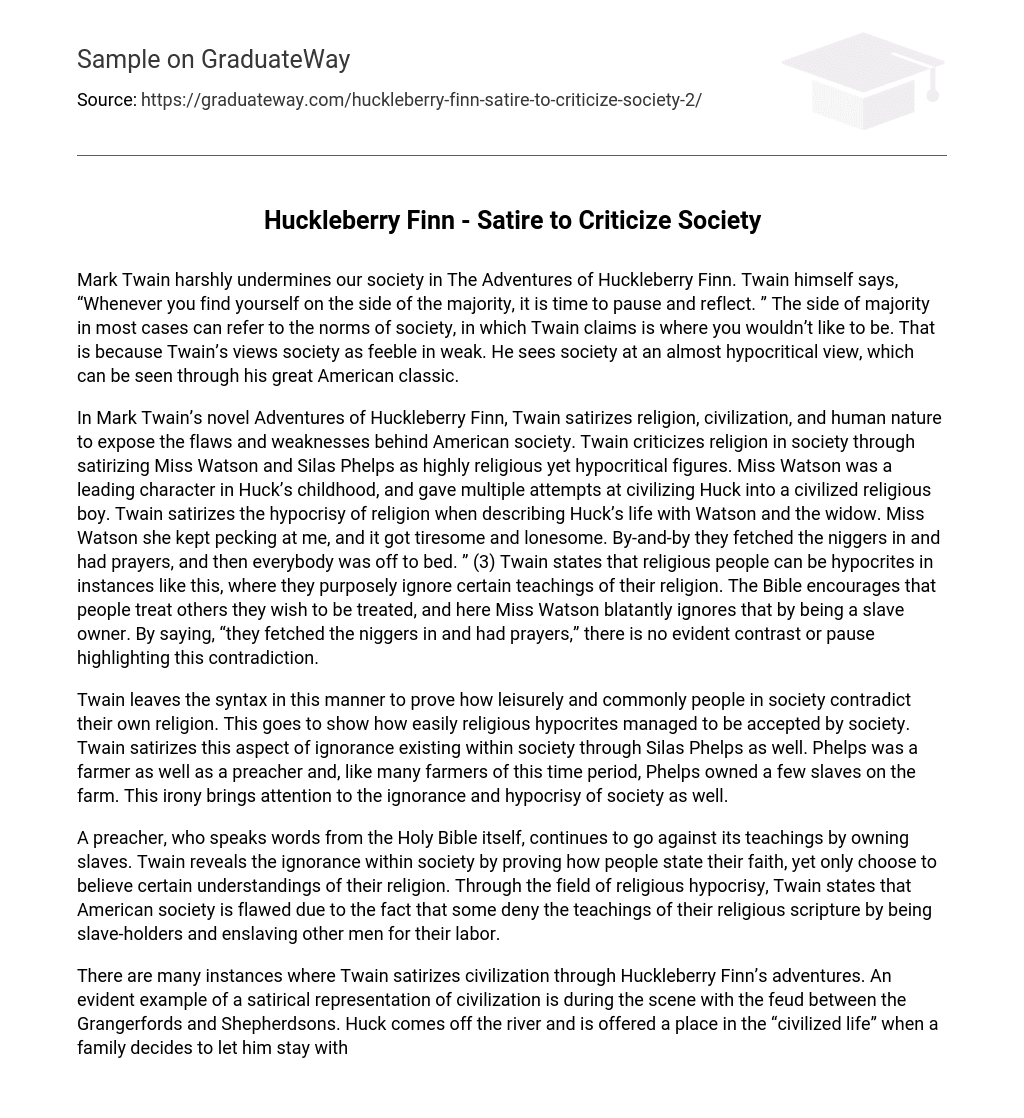In The Adventures of Huckleberry Finn, Mark Twain sharply criticizes our society. According to Twain, “Whenever you find yourself on the side of the majority, it is time to pause and reflect.” The majority, often associated with societal norms, is not where Twain believes one should be. He perceives society as feeble and weak, almost hypocritical. These views are evident in his iconic American classic.
In his novel Adventures of Huckleberry Finn, Mark Twain employs satire to critique religion, civilization, and human nature, in order to reveal the flaws and weaknesses of American society. One of Twain’s targets for religious criticism is Miss Watson and Silas Phelps, who are portrayed as devout yet hypocritical individuals. Miss Watson played a significant role in Huck’s childhood, attempting to civilize him into a religiously refined boy. Twain mocks the religious hypocrisy evident in Huck’s life with Miss Watson and the widow. Their consistent pecking at Huck became tiresome and lonely. Furthermore, when they gathered the slaves for prayers before bedtime, Twain emphasizes the hypocrisy of religious people by highlighting how they deliberately overlook certain teachings of their faith. Miss Watson’s ownership of slaves directly contradicts the biblical principle of treating others the way one wishes to be treated. The phrase “they fetched the niggers in and had prayers” shows no acknowledgment or juxtaposition of this contradiction.
Twain utilizes this syntax to demonstrate how effortlessly and frequently individuals in society contradict their own religious beliefs. This underscores how readily religious hypocrites are embraced by society. Twain also satirizes this ignorance prevalent in society through the character of Silas Phelps. Phelps, a farmer and preacher, owned several slaves on his farm, reflecting the irony and hypocrisy within society.
In spite of speaking words from the Holy Bible, a preacher violates its teachings by owning slaves. Twain exposes the societal ignorance by demonstrating how individuals claim to follow their faith, while selectively adhering to certain interpretations of their religion. Twain asserts that American society is flawed because some individuals reject the teachings of their religious scripture by enslaving others for labor and holding them as slaves, thus showcasing religious hypocrisy.
Twain’s representation of civilization in Huckleberry Finn’s adventures often involves satire. This is evident in the scene where the Grangerfords and Shepherdsons engage in a feud. Huck, as he leaves the river, is invited to join the “civilized life” by staying with a family. However, he quickly discovers that they have an ongoing feud with another family. Twain’s satire of civilized life is illustrated through the Grangerford feud as Buck explains, “It started thirty year ago, or som’ers along there.”
The text revolves around a feud between two families that leads to a lawsuit and eventually a shooting. The quote emphasizes the irrationality behind the feud, stating that anyone in the same situation would act similarly. The purpose of this sentence structure is to criticize society for its lack of rational thinking. Despite not fully knowing the reason behind the conflict, both families continue to fight rather than seeking reconciliation. Consequently, the text portrays these supposedly “civilized” families as bloodthirsty individuals with a sole desire to kill each other.
These chapters serve as a satire of American civilization by highlighting that society does not always demonstrate civilized behavior. Twain also satirizes the uncivilized aspects of human nature, which can be traced back to society’s foundation. Twain’s commentary on human nature would almost shame someone for being human when analyzed. One clear example of satirizing human nature is the king’s performance of “The Royal Nonesuch,” where he dances naked on stage in various colors to earn money.
Twain uses satire to mock human nature in this passage. Huck describes the king’s outrageous outfit and the audience’s hysterical reaction, emphasizing their ridiculousness. Through this scene, Twain criticizes both the king and the audience, highlighting their desperation for money and necessities.
The king appears “prancing out on all fours, naked” (152), showcasing the audacious nature of our duo who would stoop to any level, regardless of how demeaning, for a quick profit. This incident further establishes their rapscallion reputation. Additionally, the audience in this scene is a subject of satire as they judge and mock human nature based on their standards of entertainment. Twain suggests that men have regressed to the point where they find comedic value in someone’s desperate pursuit of money. Prior to the Royal Nonesuch, the duke expresses his disdain for their Shakespeare performance, stating, “These Arkansaw lunkheads couldn’t come up to Shakespeare: what they wanted was low comedy – and maybe something even worse than low comedy, he reckoned” (151). Despite being a target of Twain’s mockery, even the duke finds it disgraceful that these southern men fail to appreciate Shakespeare’s genius. The Royal Nonesuch satirizes both desperation and the absence of intellectual amusement in human nature. Adventures of Huckleberry Finn not only satirizes human nature but also critiques society as a whole.
Twain’s novel satirically depicts American society as ignorant, uncivilized, shamefully idiotic, and desperate, highlighting its instability. Despite being written in the late 1800s, Twain’s perception of society remains relevant to the present day. This is evident in the discussion of religious hypocrisy in the push for legalizing gay marriage in some states. Moreover, civilization is not always a happy state to be in, as the country is currently facing an economic crisis.
Today’s society often disregards the importance of education, focusing instead on reality television shows and mainstream music that lacks substance and is created by individuals with limited education. This influences the younger generation to prioritize popular culture over education and personal success. Nowadays, teenagers aspire to be featured on reality shows like “16 and Pregnant” or listen to music with explicit and provocative lyrics, while few appreciate the literary genius of Shakespeare or the depth found in classic novels. Twain predicted that society would deteriorate in certain ways, even before his own time.





